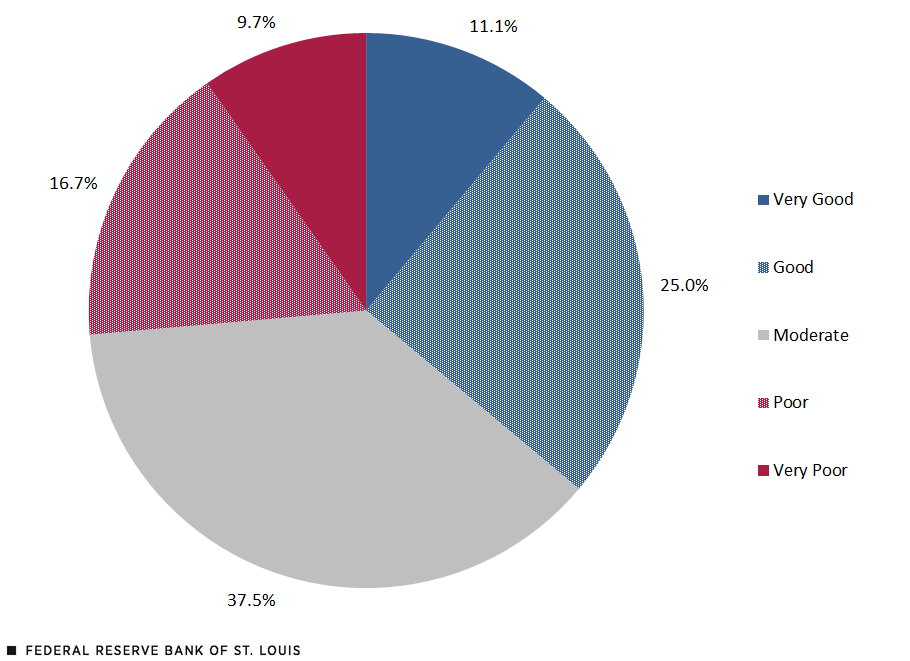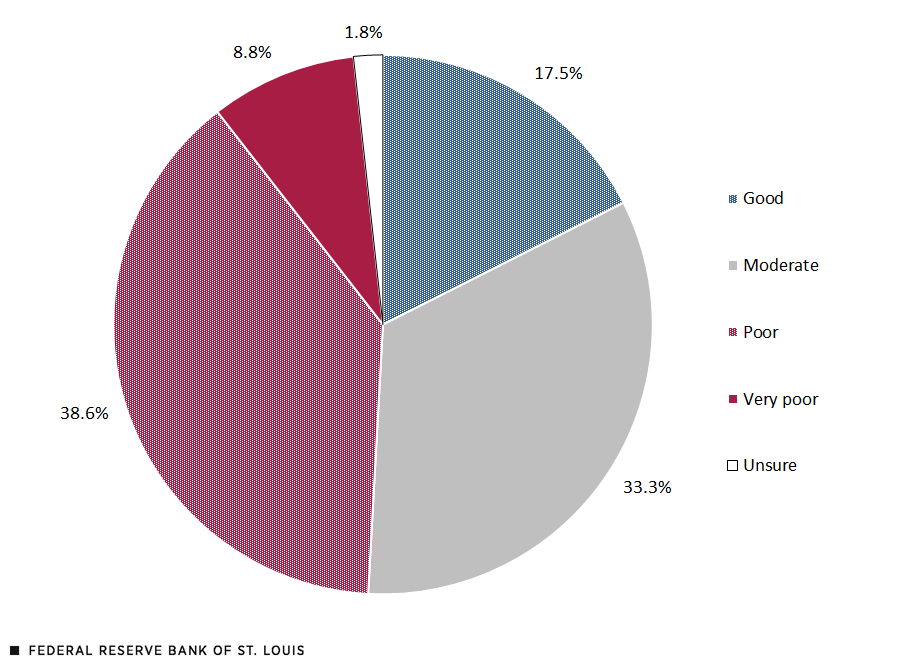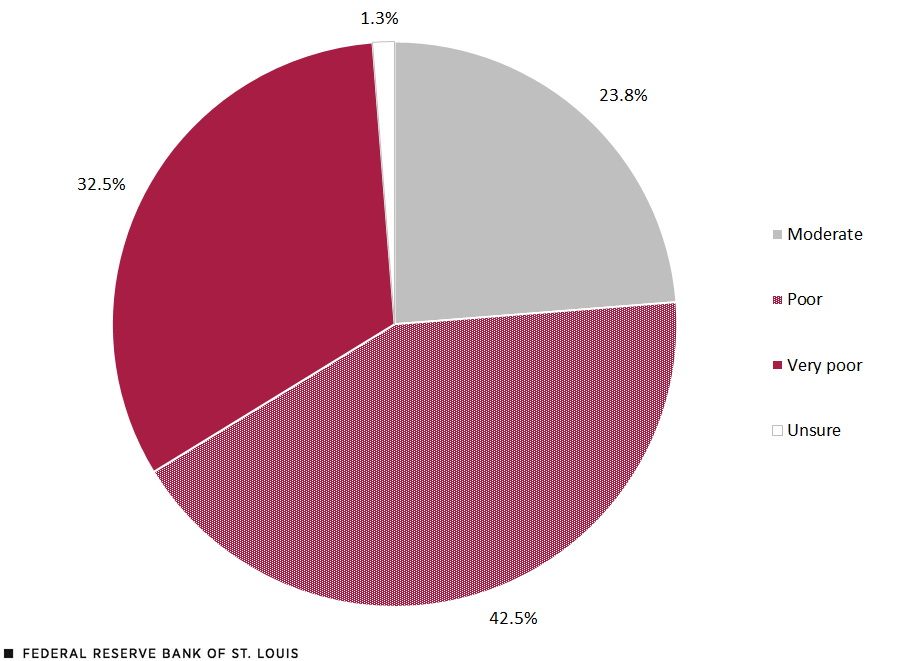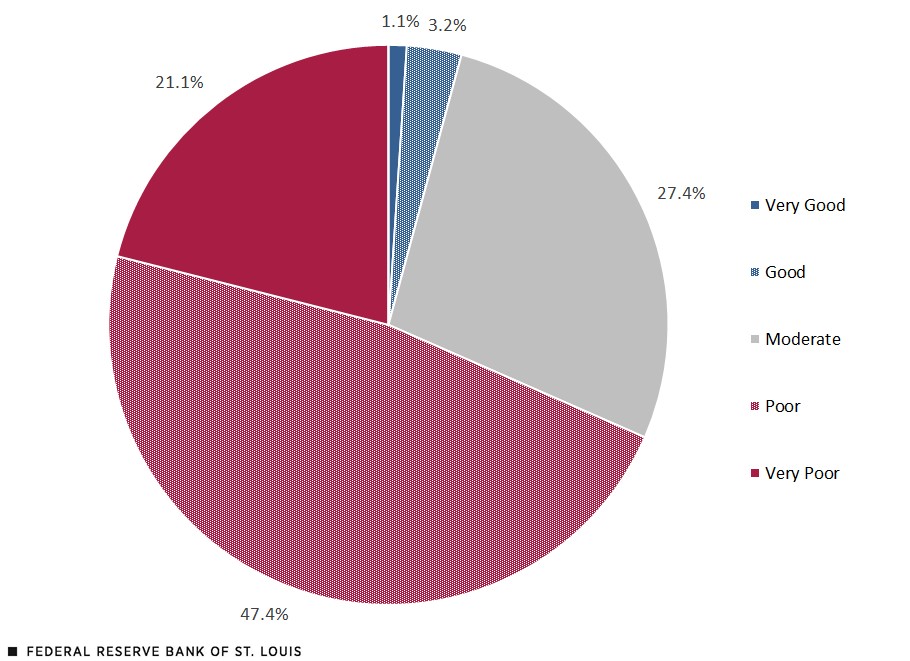Survey Shows Weakening Conditions for Economic Mobility in Eighth District
The biennial Community Development Outlook Survey (CDOS) was administered by the St. Louis Fed's Community Development department in October 2023 to assess the economic conditions of low- and moderate-income (LMI) communities and the organizations serving them in the Eighth Federal Reserve District states.Eighth District states are Arkansas, Illinois, Indiana, Kentucky, Mississippi, Missouri and Tennessee. Respondents included 604 stakeholders such as nonprofits, community-based organizations, government and education entities, and financial institutions.
This blog post highlights the two key areas currently affecting conditions for economic mobility in the Eighth District: employment and housing. The CDOS findings indicate that current economic mobility conditions for the District’s LMI communities remain poor for many. A strong labor market has been a positive contributor, but the cost of living has outpaced income growth, respondents noted. In particular, surging housing prices and reduced availability of affordable houses and rental properties have become major challenges for the LMI population.
Survey Respondents Saw Weaker Economic Mobility Conditions in 2023
When asked specifically about conditions for economic mobility,This can be understood as the combination of factors that may lead to a person’s potential to change economic position through changes in income and wealth. at least half of the survey respondents reported that conditions were poor in 2023, and 43% reported that last year’s conditions had declined from 2022. One respondent noted that the strong access to jobs and wages is somewhat offset by the higher cost of housing.
In terms of economic mobility conditions in 2024, expectations were mixed. Respondents noted that rising housing prices and the lack of available homes for rent were expected to make conditions worse in the coming year, despite the positive impact of job availability and wages in 2024.
According to survey respondents, the availability of emergency assistance has also contributed to economic mobility. However, “federal supports (are) winding down, as cost of living increases,” one respondent noted. For example, research shows that the 2021 monthly federal child tax credit reduced the number of hardships families experienced, primarily their food insecurity.
Plenty of Jobs, but Quality Remains a Concern for Workers
Overall, good labor market conditions at the macroeconomic level have also reached LMI workers, according to survey respondents. However, they reported that the quality of jobs is still a concern for workers; in particular, wages are not enough to support families. Similar to findings by the 2023 Worker Voices report, results from the CDOS showed that wages were rarely noted as a stand-alone priority and were always taken into consideration with other quality attributes, like having dignity and agency or flexibility in a job.
Organizations working on employment-related programs were asked about both areas crucial for workers: conditions for finding work and job quality.
In 2023, How Would You Rate the Conditions for Finding Work for LMI People in the Communities That Your Entity Serves?

In 2023, How Would You Rate the Job Quality Conditions for LMI People in the Communities That Your Entity Serves?

SOURCE FOR BOTH FIGURES: 2023 Community Development Outlook Survey
NOTES: Of the 72 respondents answering the “finding work” question, no one responded with “unsure.” Of the 57 respondents answering the “job quality” question, no one responded with "very good." The number of observations across different questions can differ since respondents could select questions according to their area of work.
Conditions for finding work were moderate to very good for most respondents. Specifically, 36% reported conditions being good or very good, with another 38% indicating conditions to be moderate. However, just over a quarter considered that conditions for finding work were poor or very poor. Respondents cited barriers to entering the workforce as contributing factors; such barriers include drug and background checks, skill and credential requirements, lack of affordable child care and the inability to travel to potential jobs.
Despite the challenges, 2023 saw improvements in both finding work and job quality, the respondents reported. (See the first table below.)
| Improved Substantially | Improved | No Change | Worsened | Worsened Substantially | Unsure | |
|---|---|---|---|---|---|---|
| Finding Work | 4.3% | 40.0% | 30.0% | 18.6% | 2.9% | 4.3% |
| Job Quality | 0.0% | 33.9% | 46.4% | 12.5% | 1.8% | 5.4% |
| SOURCE: 2023 Community Development Outlook Survey. | ||||||
Roughly 40% of the respondents were optimistic regarding the labor market for 2024. Availability of jobs and ability to get to them were contributing the most to a positive expectation. (See the table below.)
| Improve Substantially | Improve | No Change | Worsen | Worsen Substantially | Unsure | |
|---|---|---|---|---|---|---|
| Finding Work | 2.9% | 42.9% | 27.1% | 18.6% | 2.9% | 5.7% |
| Job Quality | 3.6% | 32.1% | 50.0% | 7.1% | 0.0% | 7.1% |
| SOURCE: 2023 Community Development Outlook Survey. | ||||||
Additionally, survey respondents indicated that improvements in the application and hiring processes are expected to play an important role in 2024; because of the pandemic, hiring processes were lengthy in recent years, and there was a lack of contact from potential employers after job seekers applied for open positions.
“While it might be easy to get a person a job, it is harder to get them a job that pays well with decent, consistent hours and, most importantly, an opportunity to do better,” one of the respondents noted.
Almost half of respondents (47%) reported job quality in 2023 to be poor, with one respondent stating that wages were “not enough to support one person, and much less a child or two.” Furthermore, other characteristics of job quality—such as inflexible or lack of advanced scheduling and employees not being treated with dignity and respect—are expected to continue being a concern for 2024, the respondents reported.
Poor Housing Conditions for LMI Homeowners and Renters
Those with low and moderate incomes often face challenges related to housing, such as housing shortage, homelessness and cost-burdened households. The recent surge in housing prices seems to have exacerbated conditions for homeowners and renters in the past year. Similar to nationwide housing headwinds, prices and lack of availability were raised as the main challenges affecting housing conditions for the LMI population in the Eighth District.
The figures below show that approximately three-fourths of the respondents indicated poor or very poor conditions for renters and almost 70% described poor or very poor conditions for homeowners.
In 2023, How Would You Rate the Conditions for LMI Renters in the Communities That Your Entity Serves?

In 2023, How Would You Rate the Conditions for LMI Homeowners in the Communities That Your Entity Serves?

SOURCE FOR BOTH FIGURES: Community Development Outlook Survey
NOTES: Of the 80 respondents answering the “renting” question, no one responded with “very good” or “good.” Of the 95 respondents answering the “homeownership” question, no one responded with “unsure.” The number of observations across different questions can differ since respondents could select questions according to their area of work.
Meanwhile, more than half indicated that housing conditions had worsened in the past year, as noted in the first table below.
| Improved Substantially | Improved | No Change | Worsened | Worsened Substantially | Unsure | |
|---|---|---|---|---|---|---|
| Renters | 0.0% | 6.3% | 30.0% | 41.3% | 20.0% | 2.5% |
| Homeowners | 0.0% | 6.3% | 22.1% | 46.3% | 23.2% | 2.1% |
| SOURCE: 2023 Community Development Outlook Survey. | ||||||
Additionally, almost half of respondents were pessimistic about the upcoming year, with the cost of renting as the main reported challenge. Furthermore, the lack of availability of affordable housing—either subsidized or not—and the distance to the place of employment were raised as main concerns. As one respondent stated, “They're living further and further away from their places of employment just to afford a roof over their head.”
| Improve Substantially | Improve | No Change | Worsen | Worsen Substantially | Unsure | |
|---|---|---|---|---|---|---|
| Renters | 0.0% | 21.5% | 29.1% | 32.9% | 13.9% | 2.5% |
| Homeowners | 2.1% | 13.8% | 40.4% | 26.6% | 10.6% | 6.4% |
| SOURCE: 2023 Community Development Outlook Survey. | ||||||
LMI communities face a similar environment when it comes to homeownership. About 70% of respondents stated that conditions for homeowners had worsened from 2022. And nearly 40% were not optimistic about their expectations for 2024. The main challenges they cited were not only prices and availability but also the ability to get financing for purchase. Lastly, many properties needed frequent and costly maintenance and repairs, which negatively impact homeowners with an already tight budget.
Overall, this blog post highlights that respondents to the CDOS saw weak economic mobility conditions for the District’s LMI communities. Optimism for a favorable labor market in 2024 should continue to positively affect LMI conditions. However, CDOS respondents indicate challenges in housing are pushing back economic mobility, and given that research confirms rental affordability conditions are the worst since 2001, these challenges may benefit from further attention.
Notes
- Eighth District states are Arkansas, Illinois, Indiana, Kentucky, Mississippi, Missouri and Tennessee.
- This can be understood as the combination of factors that may lead to a person's potential to change economic position through changes in income and wealth.
Citation
Violeta Gutkowski, ldquoSurvey Shows Weakening Conditions for Economic Mobility in Eighth District,rdquo St. Louis Fed On the Economy, March 21, 2024.
This blog offers commentary, analysis and data from our economists and experts. Views expressed are not necessarily those of the St. Louis Fed or Federal Reserve System.
Email Us
All other blog-related questions


